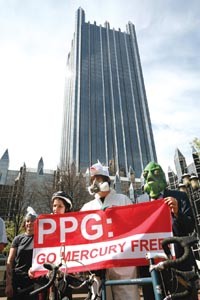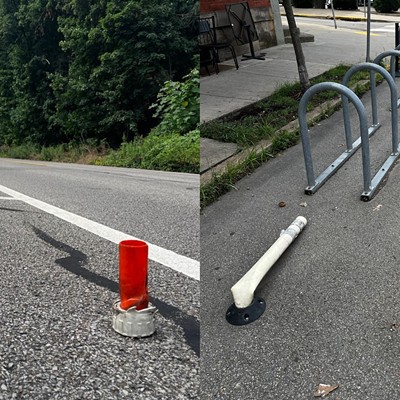In Pittsburgh, if you want to call attention to the health of our oceans, the closest you're going to get to saltwater is the Pittsburgh Zoo & PPG Aquarium. And coincidentally enough, the exhibit is sponsored by a corporation that some advocates say is harming water quality.
To draw attention to PPG's mercury emissions, the environmental-advocacy group Oceana organized an April 19 bike-ride protest. A handful of demonstrators traveled from PPG Place Downtown to the Highland Park zoo, which was hosting an Earth Day celebration that day. Some activists adorned themselves in body paint, shark fins and inner tubes for the bike ride; one wore a white Tyvek jumpsuit and respirator with the words "PPG: Go Mercury Free!" painted on the back.
PPG did not return calls for comment, but the company operates plants in Georgia, Ohio, Tennessee and West Virginia that produce chlorine. Chlorine is used in swimming pools as well as in everyday household items like plastics and paper towels. But Oceana activist Jon Pezold says that some of PPG's production relies on a harmful "mercury-cell" process. Developed in the late 1800s, the process involves pumping saltwater through a vat of mercury, which can build up in water and the atmosphere. Mercury is a toxic metal that accumulates in fish and builds up in the human blood stream, which can cause serious developmental and health problems.
"Japan outlawed this technology 35 years ago," Pezold said at the protest. "It's time we do it, too."
In fact, Ocean launched its campaign against the mercury-cell process back in 2005. A few months after that effort began, some operators either closed or altered their plants. PPG converted its chlorine plant in Louisiana in August 2005, a process that reportedly cost more than $90 million.
Still, Pezold points to federally mandated environmental reports that show PPG releases 340 pounds of mercury into the air and water a year. That may not sound like much, "An eighth of a teaspoon of mercury is enough to contaminate the fish in a 25-acre lake," Pezold said. "340 pounds of this stuff is just outrageous."
Converting a plant is expensive, but "The new system would save [PPG] a third of their emissions costs," Pezold said. "It's difficult for me to understand why they haven't switched."















